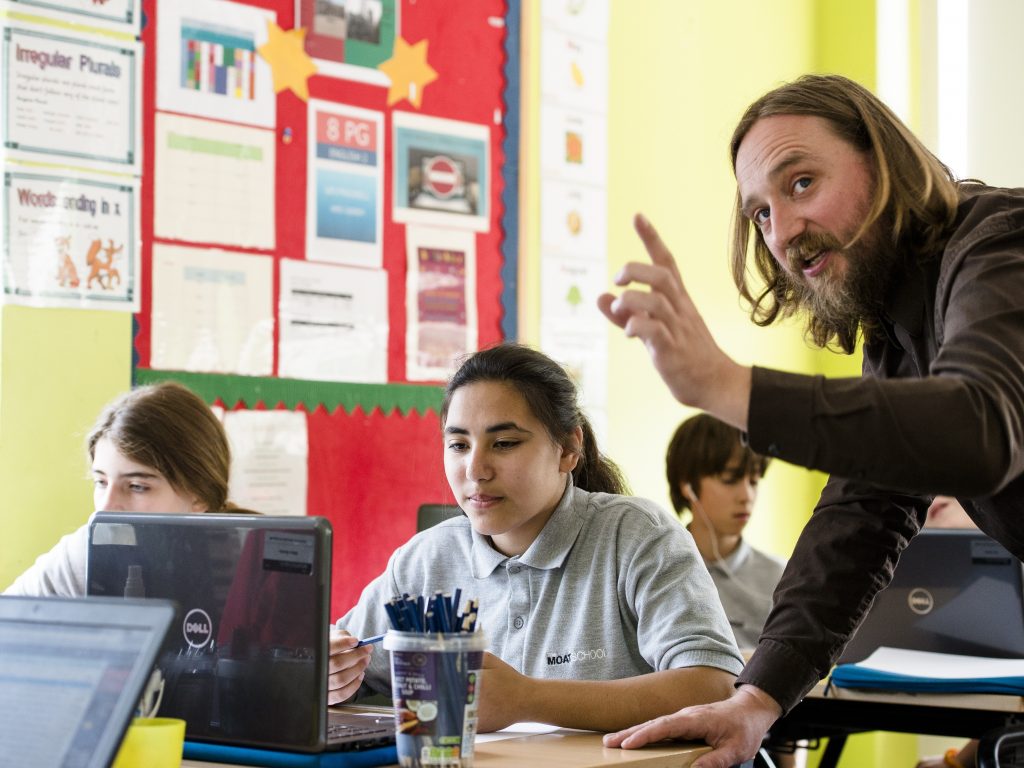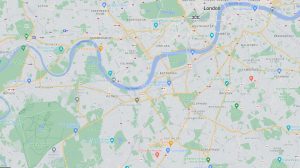The Maths curriculum is broadly divided into six subject areas, which are:
- Number
- Algebra
- Ratio, proportion and rates of change
- Geometry and measures
- Probability
- Statistics
The scheme of work is based on the White Rose curriculum, ensuring a structured and coherent approach to mathematical learning. Mathematics is taught in a series of short topics, typically lasting about two weeks each. For instance, a topic like “Angles” falls under “Geometry and Measures” and is introduced at a basic level in Year 7. This topic is then revisited and explored at a more advanced level in subsequent years.
Larger topics, such as “Equations,” are divided into subtopics and spread throughout the academic year. This spiral-structured approach provides greater variety and mental stimulation for students, avoiding the monotony of prolonged focus on closely related concepts. Additionally, it enhances opportunities for revision and reinforcement, which is especially beneficial for students with dyslexia or dyscalculia.
We also provide tailored booklets that are colour-coded at different levels and feature extra working-out space, specifically designed to support dyslexic and dyscalculic students. These resources help students engage more effectively with the material, providing the necessary space for working through problems at their own pace.
Year 7 Interventions for Multiplication and Division
In Year 7, targeted interventions for multiplication and division are implemented, utilizing bespoke methods tailored for dyslexic and dyscalculic students. One effective approach is the lattice method, which simplifies the multiplication process by breaking it down into smaller, manageable steps. This visual method helps students understand the relationship between numbers and improves their overall confidence in arithmetic operations. Other tailored strategies are also employed to support diverse learning styles, ensuring that all students grasp these essential skills effectively.
Year 8 – 9 Intervention: Entry Level
The Entry Level qualification is designed to run in Year 8 and 9 and focuses on reinforcing the fundamental concepts of mathematics in preparation for Key Stage 4. This intervention is delivered on a one-to-one basis alongside the main curriculum, providing students with personalized support to ensure they build a solid foundation in essential skills.
Evidence from eight components is required for moderation:
- Properties of Number
- The Four Operations
- Ratio
- Money
- The Calendar and Time
- Measures
- Geometry
- Statistics
Assessments and Methods
Students’ understanding of each topic is evaluated through their participation in class, completion of homework, and short tests administered at least once every half term. The “Using and Applying Maths” segment of the curriculum is delivered through investigative tasks, some of which are practical problems, while others are numerical or algebraic experiments.
In Key Stage 3 (KS3), students are organized into one stretch and challenge group and two middle sets per year. This structure aims to provide an appropriate level of challenge for all students, with the stretch and challenge group engaging with more advanced concepts while the middle sets receive tailored support to build their confidence and skills.
Key Stage 4 Pathways
In Key Stage 4 (Year 10 and 11), we offer three pathways:
- Higher Paper iGCSE (Edexcel)
- Foundation Paper iGCSE (Edexcel)
- Foundation Skills (Edexcel)
Students who achieve a Functional Skills Level 2 will receive a qualification equivalent to a grade 4. This flexible approach ensures that all students can access a pathway that best suits their needs and abilities.
Creating a Positive Experience with Mathematics
Many students arrive with negative experiences in mathematics. At BHS, we strive to foster a positive learning environment by utilizing:
- Abundant physical and visual materials
- Engaging games
- Real-life examples of mathematical applications
A highlight is the Number Activity Session, where all Year 7, 8, and 9 students take a break from their usual timetable to engage in hands-on activities involving mathematics. Past activities have included constructing the tallest tower from paper, designing and painting giant geometric murals, and participating in a mental arithmetic “quiz show” to win the Mathematics Trophy for their house.
Multisensory Strategies Employed by the Mathematics Team
The Mathematics Team employs various multisensory strategies, including:
- Using cubes and building blocks to explore area and volume
- Engaging in origami to learn about shapes and angles
- Examining the intersection of mathematics and art, such as tessellations
- Conducting project work, like CSI-style investigations and crash testing simulations
- Collecting personal data for data handling exercises
- Utilizing mini whiteboards, multiplication squares, number grids, counting cubes, and other hands-on resources
Completion of mathematics is crucial for students aspiring to further their education in A-Level or college courses. Mathematics serves as the foundation for many disciplines, including Science, Design and Technology, Engineering, Computer Science, Health, Food Technology, and Construction. Therefore, we strive to ensure all students achieve a grade that accurately reflects their true capabilities.
Parent Portal
Parents can find specific curriculum information in their child’s termly ICM reports. These can be accessed via the Parent Portal: https://schoolbase.online



